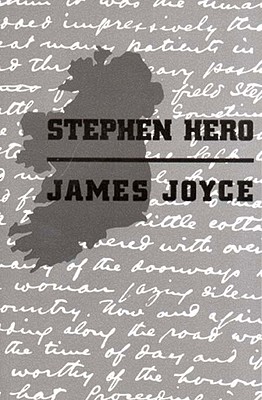APS TOGETHER
Day 3
Stephen Hero by James JoyceXVII, pp. 48-68
January 14, 2022 by Belinda McKeon
An unstable home-life, threatening ever more towards violence; that’s the backdrop of Chapter XVII, both in Stephen’s own life and in the life of Ireland itself, as the appetite for revolution against British rule grows. Stephen’s father fears that his son is “falling into bad company” (nobody tell him that Stephen is the bad company), and that his evening walks with his younger brother risk corrupting the latter to “idle habits,” so they must stop; he’s also to pull himself together at university and succeed “brilliantly” at his looming exams, or forfeit his education altogether. Maurice, the younger brother is the one most affected by all of this, losing as he does his access to the rebellious territories carved out by Stephen; Stephen himself (to anticipate one of his gleefully irreverent pronouncements from later in the chapter) frankly doesn’t give a toss. He has no intention of ascending to “remunerative respectability” and thereby solving his family’s financial problems; he’s only grateful that this expectation, and its accompanying suggestion of his potential power, has furnished him with the “egoism” and talent for self-centredness which is now serving him so well as he applies it to his ambitions as an artist. Poor young Maurice may miss his nightly passegiata, but Stephen has his “solitude” and his “human channels” to fulfill him—see again that talent for claiming isolation whilst simultaneously enjoying a social life.
In this chapter, Stephen is writing a paper which he intends to deliver at one of the college debating society events; the Literary and Historical Society, or L&H, still endures as a central aspect of student life at University College Dublin—central like central heating, that is, lots of humid talk and sweaty efflorescence—and like many an undergrad before him, Stephen is convinced that the paper he is preparing to deliver will blow the doors off the debating chamber: “It seemed to him that the students might need only the word to enkindle them towards liberty or that, at least, his trumpet-call might bring to his side a certain minority of the elect.” By liberty, he doesn’t mean the liberty of nationalism, which is running hot everywhere around him in Dublin, as the rest of the chapter shows, but the liberty of something more like Stephenism. If, in Chapter XVI, we saw Stephen insist upon a classical rather than a romantic view of art—in the view that real poetry is brought into being painstakingly, by means of hard graft and deliberate strategy—and declare that “every moment of inspiration must be paid for in advance”, then here we see that this conscientiousness does not apply to what he considers the only way to actually live one’s life. Stephen is monkish in his art (or sees himself as being so), but his friend McCann is monkish in his daily practices, abstaining from drink and sex and blasphemy and all the things that, for Stephen, make life worthwhile. Stephen gives him a merciless but affectionate ribbing over this piety, but it bothers him, too, because he truly does not understand “what right the future [has] to hinder him from any passionate exertions in the present.”
Speaking of passionate exertions, in this chapter we see Stephen on the prowl, trying to find out the whereabouts of the young woman we saw him meet in Chapter XVI. Emma Clery, who back at the salon in Donnybrook, took charge of the situation by standing in front of the “musing” Stephen and saying “I think we know each other already” (we stan a swiping-right queen!), has not left his mind, and nor has the awareness that she is as nationalistic and as passionate about the Irish language as he himself is ideologically squeamish of these things. For Stephen, the Catholic church, not the British State, is the villain in Irish culture—“The Roman, not the Sassenach, was for him the tyrant of the islanders''— but still, if he wants to get in with Emma Clery, he’s going to need to pretend to be interested in speaking Irish. He says so “lyingly” (can we get some love for this Joycean adverb, by the way) to another of his nationalism-mad college acquaintances, Madden. Madden is delighted at the prospect of a “convert,” and tries to corner Stephen into a sort of Profession of Faith in all things Sinn Féin but Stephen claims the artist’s prerogative not to “settle everything all at once.” Give me time, he snaps at Madden, and slowly his “new freak,” that is, his education in the Irish language, gets underway. Pretty quickly, Stephen attains from this study that which he has hoped for; the information about which section Miss Clery attends. It’s not the beginners’ class, needless to say, and convincing though he may be in many other regards, Stephen is unable to sweet-talk himself into a more advanced session, and finds himself stuck in a classroom with a number of idiots who laugh and blush over the Irish word for “love.” After a few weeks of this, his disdain for the language, for those who believe in it, and for everything they represent, infects even his lust for Miss Clery. What he fantasizes about now is less her “warm ample body” than the thrill he would get from shoving Emma and her young priest friend, Father Moran, into each other’s arms in front of the entire ardent classroom of Irish scholars. By the end of the chapter, walking Emma a final time to her evening tram stop at Nelson’s Pillar, Stephen is regarding her (in anticipation of Gabriel Conroy’s secret thoughts about his wife Gretta in “The Dead”) with a snobbish contempt. And dare we ask how much Irish he has to show for himself after the whole campaign?
